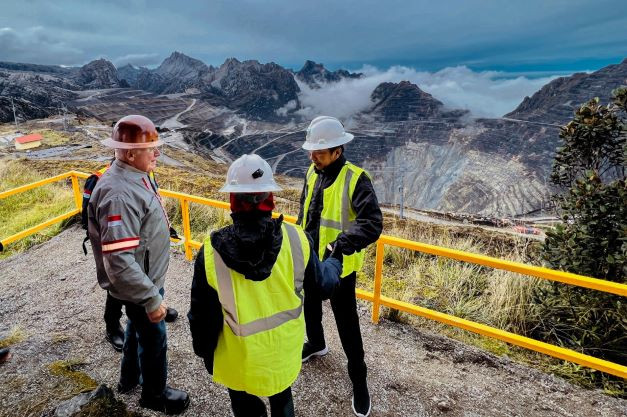Popular Reads
Top Results
Can't find what you're looking for?
View all search resultsPopular Reads
Top Results
Can't find what you're looking for?
View all search resultsThe new American playbook: Climate resilience
Today, the US is compelled to expand its economic presence in order to compete with China in Asia-Pacific affairs.
Change text size
Gift Premium Articles
to Anyone
 Gold mine: President Joko “Jokowi” Widodo (right) speaks with Richard Adkerson (left), director of the Freeport-McMoRan Copper and Gold company at the Grassberg mine in Mimika during Jokowi’s visit on Sept. 1, 2022. In 2018 Indonesia acquired Freeport, a giant United States company operating in the country. (AFP/Presidential Palace)
Gold mine: President Joko “Jokowi” Widodo (right) speaks with Richard Adkerson (left), director of the Freeport-McMoRan Copper and Gold company at the Grassberg mine in Mimika during Jokowi’s visit on Sept. 1, 2022. In 2018 Indonesia acquired Freeport, a giant United States company operating in the country. (AFP/Presidential Palace)
B
y the first quarter of 2023, United States companies are expected to come clean on their exposure to climate change. Under the Securities and Exchange Commission’s (SEC) planned climate disclosure rules, American companies will have to spell out climate-related risks that could impact their business, operations or financial health.
As the era of cheap money quickly fades into memory, aren’t these just more noise and obstacles for investors?
With billions of dollars of investment pledged for the ASEAN region, we think it worthwhile looking at what this means, specifically. In particular, what are the consequences of physical climate change for US bilateral aid programs targeting ASEAN’s largest economy, Indonesia?
We consider the SEC’s climate disclosure ruling timely for bilateral development facilities like the Just Energy Transition Partnership (JET-P), seeking to invest in green energy and also more established development programs under USAID and the Millennium Challenge Corporation (MCC) looking to drive sectoral economic growth.
Geopolitically, the US has a long history of close relations with Indonesia, from military assistance to economic reform. Today, the US is compelled to expand its economic presence in order to compete with China in Asia-Pacific affairs. One way to create a desirable counterbalance to China is through channeling private capital flows into emerging market projects.
However, the primary challenge remains finding investment-grade projects to select.
Infrastructure still promises the classic, high density bang-for-the-buck in development. Indonesia’s existing infrastructure spend reaches its 10-year target of US$450 billion in 2024. Debt-laden public sector builders behind this rollout have maxed out the supply of cheap credit from state-owned banks and are actively seeking private capital.
The country's sovereign wealth fund, the Indonesia Investment Authority (INA), is the third part of a trio of agencies trying to raise capital by selling newly built assets like toll road concessions to the market.
This presents a significant opportunity for smart capital sitting across the Pacific. Now let's get back to the initial question. Isn’t expecting US corporations to now disclose potential climate-related risks – such as losses from future extreme weather events in irregular settings like Indonesia –unlikely to provide any synergy for US objectives in the region?
Asked another way, can we reduce risk, attract investment into projects and build resilience in the face of possible climate disruptions in Indonesia? We firmly believe this is a yes proposition.
Climate disclosures provide an opportunity to improve the quality of evidence at the system level (effects on people and places) and limit potential for greenwashing, which is often associated with economic, social and environment (ESG) frameworks. Starting with what we all know: Every project is a prediction and we should focus on positioning rather than predicting futures.
Indonesia’s menu of capital projects are located in dynamic, unpredictable landscapes. This calls for a structured approach that starts by considering possible futures based on the information we have today and limits forecasting, which just adds +/- estimates over project life.
Here’s how bilateral programs can now update their investment models:
First, replacing the forecasting mindset with a foresight thinking mindset. Rather than accept the build-it-and hope-for-the-best predictions hard-wired into environmental-social impact assessments and ESG checklists, proponents can stress-test from the “future backwards” to size up what the asset and its social-economic and environmental story could look like, (e.g. more land clearing for commodity crops and urbanization that amplify the effects of higher intensity rainfall to create more flood disruptions, asset damage, higher maintenance to loss of value at exit).
Second, open data disclosure with AI cloud infrastructure. Launched by NASA and powered by Silicon Valley, insights from space have come down to earth in terms of accessibility; with a few lines of code and pay-as-you-go pricing, project teams anywhere can factor system risks and identify opportunities, unhindered by reporting bias and disclosing-party blind spots
Third, create a “Climate Resilience Moonshot” of best practices for use worldwide. This can greatly improve the capital allocation, selection and delivery of investment-grade projects that unlock financial flows and strengthen resilience to natural and human-related shocks.
US-backed development facilities and private capital can make better investment decisions and increase confidence by applying these forms of resiliency preparation as part of due diligence. This approach fully aligns with existing sustainability and climate-risk frameworks so thankfully no new standards are required.
US proponents can accelerate capital formation and project selection through properly costed climate and non-climate risk allocations. By pricing risk and resilience with foresight thinking, the US and its Indonesian partners can meaningfully deliver investment-grade projects that mobilize private sector engagement linked to financial resources.
A new American playbook focused on climate resiliency would provide a competitive advantage in scaling the required financial and intellectual capital to support Indonesia’s value proposition for foreign direct investment.
Geostrategically, it provides a significant counter to what many are experiencing with China's one-dimensional lending and investment.
The stakes couldn’t be higher.
***
Tariq Khalil is managing director of Mosaic Risk Analytics. Edward Gustely is cofounder and managing director of Penida Capital Advisors Ltd.









